For an early-stage startup, every minute and dollar is mission-critical. Juggling product development, customer acquisition, and fundraising leaves little room for manual, time-consuming tasks like posting across multiple social media accounts. While a dedicated social media manager seems like a logical hire, the reality is that a powerful software platform can deliver more efficiency and data-driven results for a fraction of the cost. This is where the best social media management tools become indispensable, acting as a force multiplier for lean startup teams and optimizing a key aspect of their growth strategies.
These platforms solve a core operational bottleneck: the fragmented and inefficient nature of managing a multi-channel online presence. Instead of logging in and out of Twitter, LinkedIn, Instagram, and Facebook, founders can schedule, publish, and analyze all content from a single, unified dashboard. This isn't just about saving time; it's a strategic framework for building a consistent brand voice, engaging with a community systematically, and gathering the performance data needed to prove ROI to stakeholders and investors. According to research from McKinsey, data-driven organizations are not only more likely to acquire customers but are also significantly more profitable.
This resource is designed to help founders bypass the noise and identify the right tool for their specific operational needs. We’ve moved beyond generic feature lists to provide an in-depth analysis of the leading platforms, including Hootsuite, Sprout Social, and Buffer. For each tool, you'll find a detailed breakdown of its core features, ideal use cases for startups, honest pros and cons, and transparent pricing comparisons. This guide will help you determine which platform can best serve as your startup’s next strategic hire for building visibility and authority.
1. Hootsuite
Hootsuite is one of the most established and comprehensive platforms in the social media management space, making it a reliable choice for startups ready to implement structured social media workflows. It provides a full-stack solution covering publishing, engagement, analytics, and social listening, positioning it as a strong contender among the best social media management tools for teams that require robust control and collaboration features. Its maturity in the market is evident through its refined user interface and deep integration ecosystem.
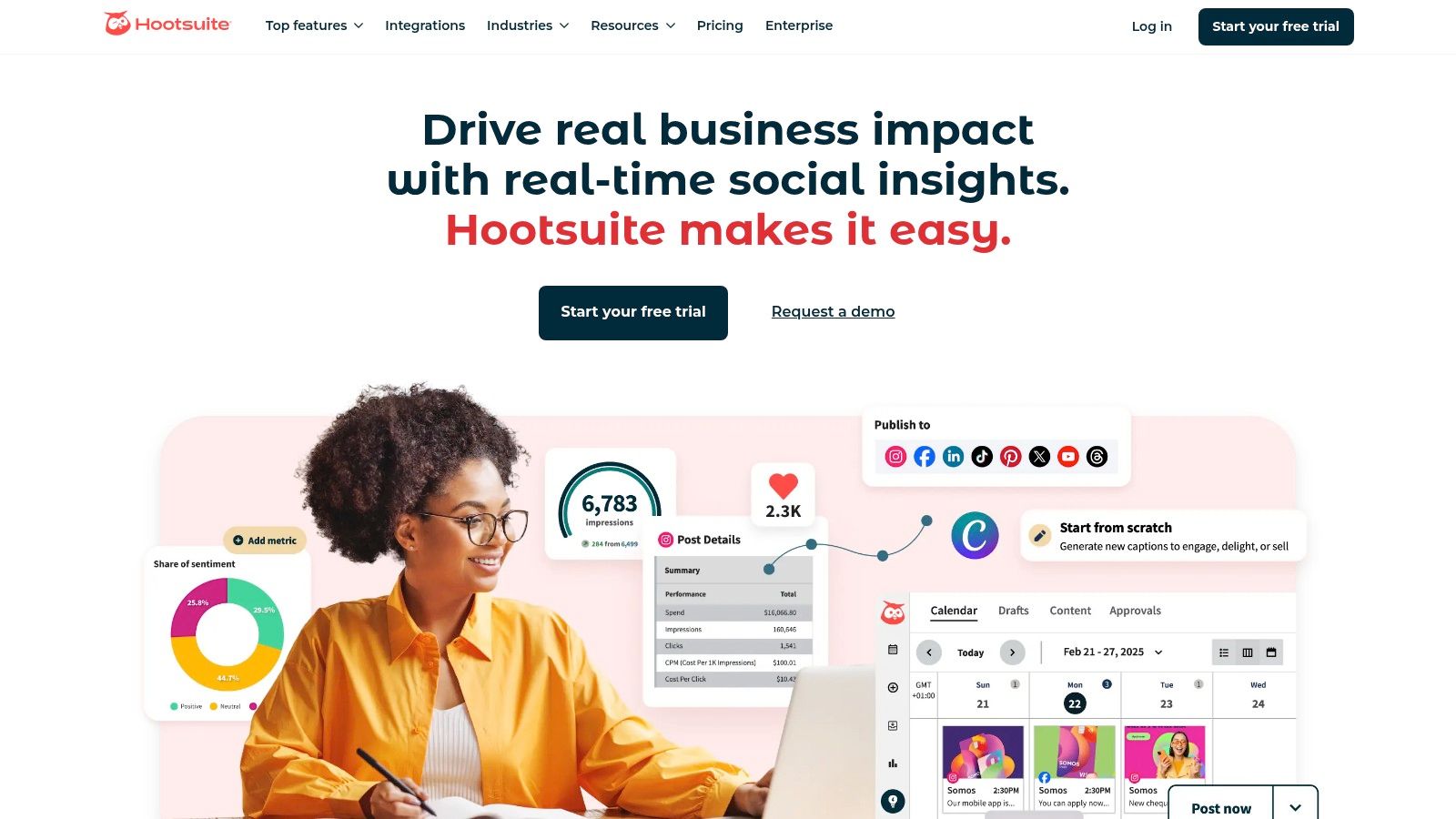
The platform excels at centralizing a startup’s entire social media presence. From a single dashboard, teams can schedule unlimited posts across all major networks, utilizing its AI-powered "best time to post" feature to maximize reach. The unified "Inbox" feature is particularly valuable for customer service and engagement, allowing multiple team members to manage DMs and comments, assign conversations, and use automated responses to maintain brand responsiveness—a crucial element for customer acquisition and retention.
Core Features & Use Case
For a startup scaling its marketing team, Hootsuite’s approval systems and team assignments are critical for maintaining brand positioning. A junior marketer can draft content, which is then automatically routed to a manager for approval before publishing, ensuring brand consistency and quality control. The built-in Canva templates and AI content generator also streamline content creation, saving valuable time for resource-constrained founders.
- Key Feature: Unified inbox with team assignments and automated direct message responses.
- Ideal Use Case: A B2B SaaS startup managing a high volume of inbound leads and customer support queries across LinkedIn and Twitter. The team can assign conversations to sales or support specialists directly within the Hootsuite inbox, ensuring no lead or issue is missed.
Pricing and Limitations
Hootsuite's pricing begins with the Professional plan at $99/month for one user and three social accounts, scaling up to Team and custom Enterprise tiers. While powerful, the per-seat pricing model can become costly as a startup grows. Furthermore, advanced features like in-depth competitor benchmarking, sentiment analysis, and flexible analytic date ranges are often gated behind the more expensive plans, which may be a limitation for early-stage startups on a tight budget.
Website: https://www.hootsuite.com/
2. Sprout Social
Sprout Social positions itself as a premium, all-in-one platform and stands out as one of the best social media management tools for startups prioritizing data-driven decision-making. It delivers a sophisticated suite of features for publishing, engagement, deep analytics, and social listening. The platform is designed to scale with a business, offering enterprise-grade functionality that helps growing teams turn social data into strategic business intelligence—a core attribute of successful, adaptable founders.
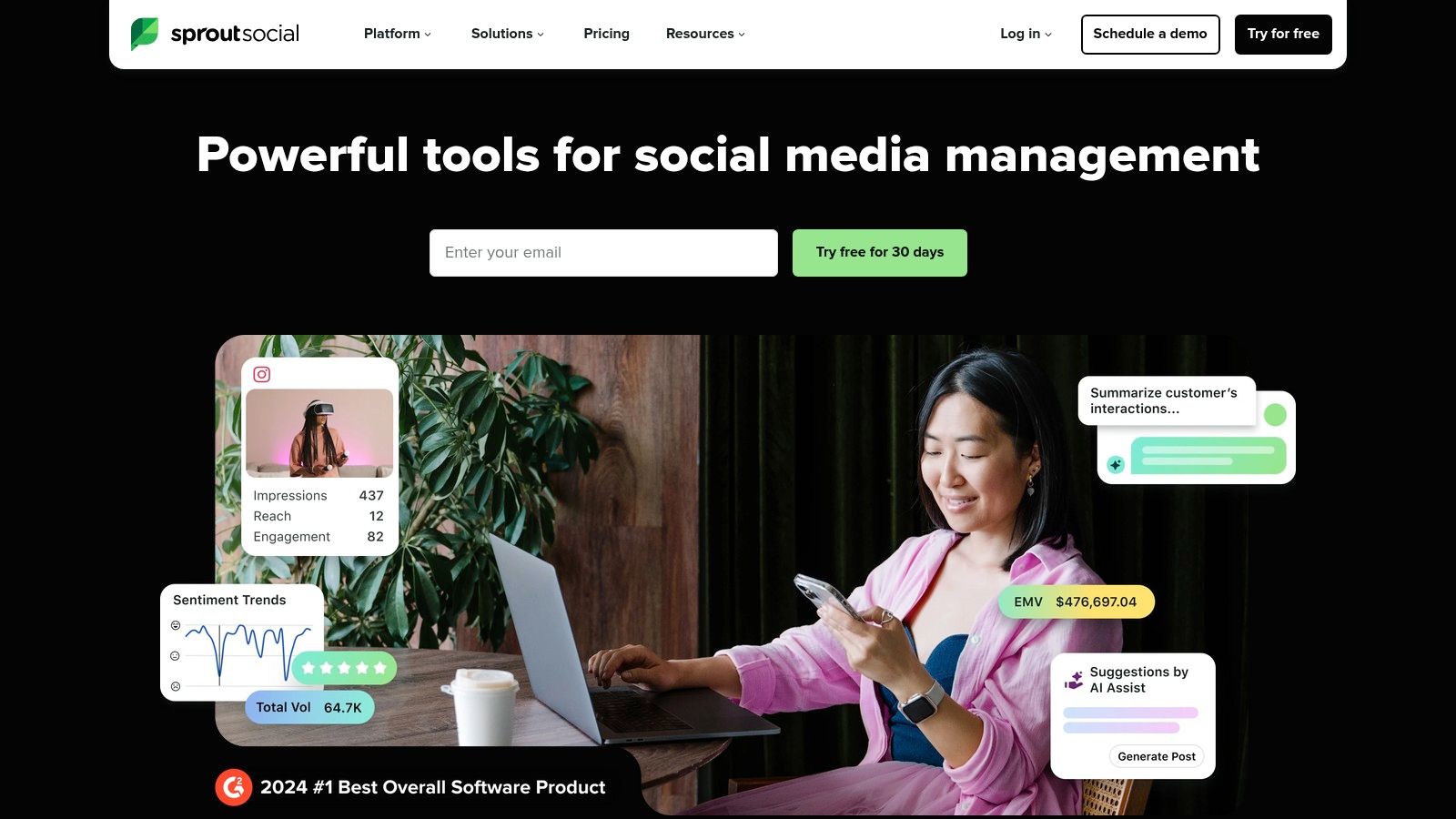
The platform’s strength lies in its exceptional analytics and reporting capabilities, which go far beyond surface-level metrics. Teams can use advanced tagging to categorize inbound and outbound messages, generating granular reports on campaign performance, response times, and content themes. The Smart Inbox centralizes all incoming messages and mentions into a single stream, while its AI Assist feature helps teams draft content and refine replies, enhancing both efficiency and brand voice consistency.
Core Features & Use Case
For a startup focused on proving ROI to meet investor expectations, Sprout Social’s reporting is invaluable. A marketing manager can create custom reports that directly compare paid and organic performance, track competitor activity, and identify top-performing content. This data can be used to justify budget allocation and refine future content strategies effectively, showcasing a founder's commitment to financial management and operational excellence.
- Key Feature: Advanced analytics with granular tagging and best-in-class competitive analysis reports.
- Ideal Use Case: A D2C e-commerce startup using Instagram and TikTok to drive sales. The team can tag inbound messages related to product inquiries or customer feedback, then run reports to identify trends and measure how social engagement directly impacts website clicks and conversions.
Pricing and Limitations
Sprout Social's pricing starts with its Standard plan at $249/month for one user, with additional users costing more. The Professional and Advanced plans unlock more powerful reporting, automation, and listening features. While its capabilities are extensive, the high per-seat starting price can be a significant barrier for early-stage companies. Furthermore, some advanced features, such as deep social listening or premium analytics, may require add-on purchases, increasing the total cost of implementation.
Website: https://sproutsocial.com/
3. Buffer
Buffer is known for its simplicity and affordability, making it one of the best social media management tools for individual founders and lean startups prioritizing an intuitive workflow. It focuses on core publishing and analytics features done exceptionally well, providing a streamlined experience without the complexity of enterprise-level suites. Its flexible, pay-per-channel pricing model allows startups to scale their investment as their digital authority grows, aligning with best practices for financial management in early-stage ventures.
The platform strips away unnecessary clutter, offering a clear dashboard for scheduling posts, managing a content queue, and reviewing performance. Its "Ideas" workspace and AI Assistant help teams brainstorm and draft content efficiently, while the hashtag manager helps optimize post reach. The ability to schedule the first comment on platforms like Instagram is a practical feature for keeping captions clean and organizing hashtags—a small but significant operational optimization.
Core Features & Use Case
For an early-stage startup, Buffer’s straightforward scheduling and engagement tools are invaluable. The platform allows a founder or a small team to quickly build a content calendar and manage comments from a unified inbox without a steep learning curve. The AI Assistant can help generate post variations or brainstorm new angles, saving critical time for resource-strapped teams focused on product-market fit.
- Key Feature: Flexible per-channel pricing and an integrated AI Assistant for content creation.
- Ideal Use Case: A D2C e-commerce startup that is active on Instagram, TikTok, and Pinterest. The founder can use the free plan to manage up to three channels, then add more channels with the affordable "Essentials" plan as the business expands, only paying for what they actively use.
Pricing and Limitations
Buffer’s generous Free plan supports up to three channels, making it highly accessible. Paid plans start with Essentials at $6/month per channel, with a Team plan available for enhanced collaboration. While its pricing model is budget-friendly, this can become less cost-effective as a startup adds many social channels. Buffer's native analytics are also less advanced than competitors like Hootsuite, which could be a limitation for data-driven teams needing deep competitive insights for scaling their startup.
Website: https://buffer.com/
4. Later
Later has cemented its reputation as one of the best social media management tools for visually-driven brands, particularly those focusing on Instagram and TikTok. Its platform is built around a visual content calendar, allowing startups to plan their feed's aesthetic with a simple drag-and-drop interface. This emphasis on visual planning makes it an indispensable technology for e-commerce, lifestyle, and creative-focused startups that rely on a strong visual identity to build brand positioning and credibility.
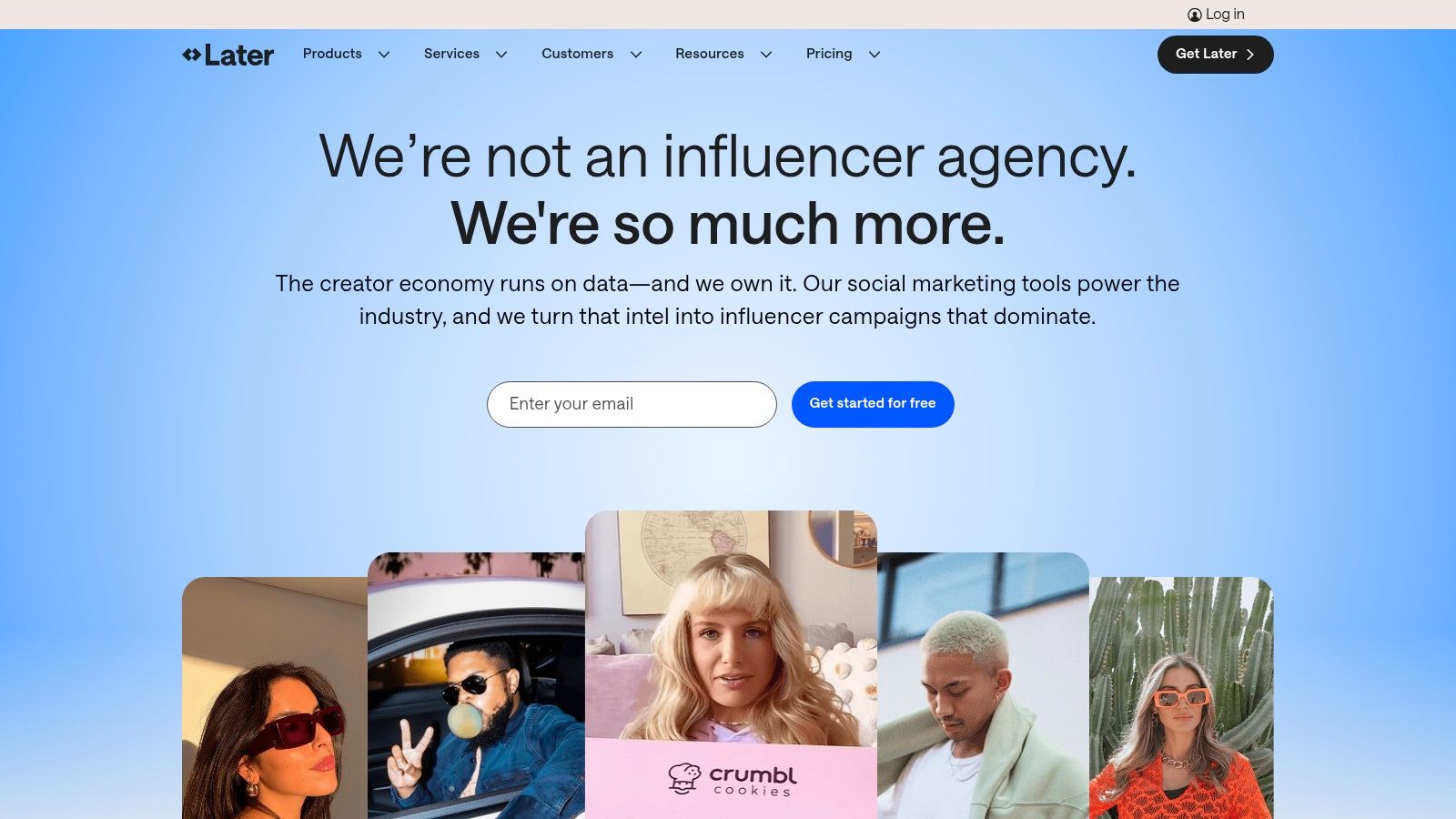
The platform’s strength lies in its streamlined workflow for visual-first networks. Startups can schedule posts, Reels, and Stories while previewing how their Instagram grid will look weeks in advance. Its integrated Link in Bio feature provides a customizable landing page to drive traffic and sales directly from social profiles—a crucial function for direct-to-consumer brands looking to optimize customer acquisition channels. The user experience is clean and intuitive, making it accessible for founders without dedicated social media managers.
Core Features & Use Case
For a startup leveraging influencer marketing as part of its publicity strategy, Later's collaboration tools are highly effective. Teams can invite creators to upload content directly, which can then be scheduled by the marketing manager, maintaining a consistent publishing schedule without cumbersome file transfers. The built-in AI content assistant also helps generate captions and content ideas, overcoming creative blocks and saving time.
- Key Feature: Visual-first content calendar with Instagram grid preview and drag-and-drop scheduling.
- Ideal Use Case: An e-commerce startup in the fashion or home decor space. The team can visually plan its entire month of Instagram content, ensuring a cohesive brand aesthetic, schedule product-tagged posts, and use the Link in Bio feature to direct followers to specific product pages.
Pricing and Limitations
Later offers a Starter plan starting at $25/month for one user, which includes 30 posts per social profile. Higher-tier Growth and Advanced plans increase post limits and unlock features like in-depth analytics and team collaboration. While the visual planner is best-in-class, a key limitation is the monthly post limit on lower-tier plans, which may be restrictive for startups with a high-volume content strategy. Some advanced team approval workflows are also reserved for the more expensive plans.
Website: https://later.com/
5. Agorapulse
Agorapulse has carved out a strong position among the best social media management tools by focusing on deep engagement and robust moderation features. It is particularly well-suited for startups managing high-volume community interactions, including paid ad comments. The platform offers a comprehensive suite that covers publishing, reporting, and listening, but its true differentiator lies in its powerful, unified social inbox that ensures no comment or message goes unnoticed, protecting a startup's hard-won credibility.
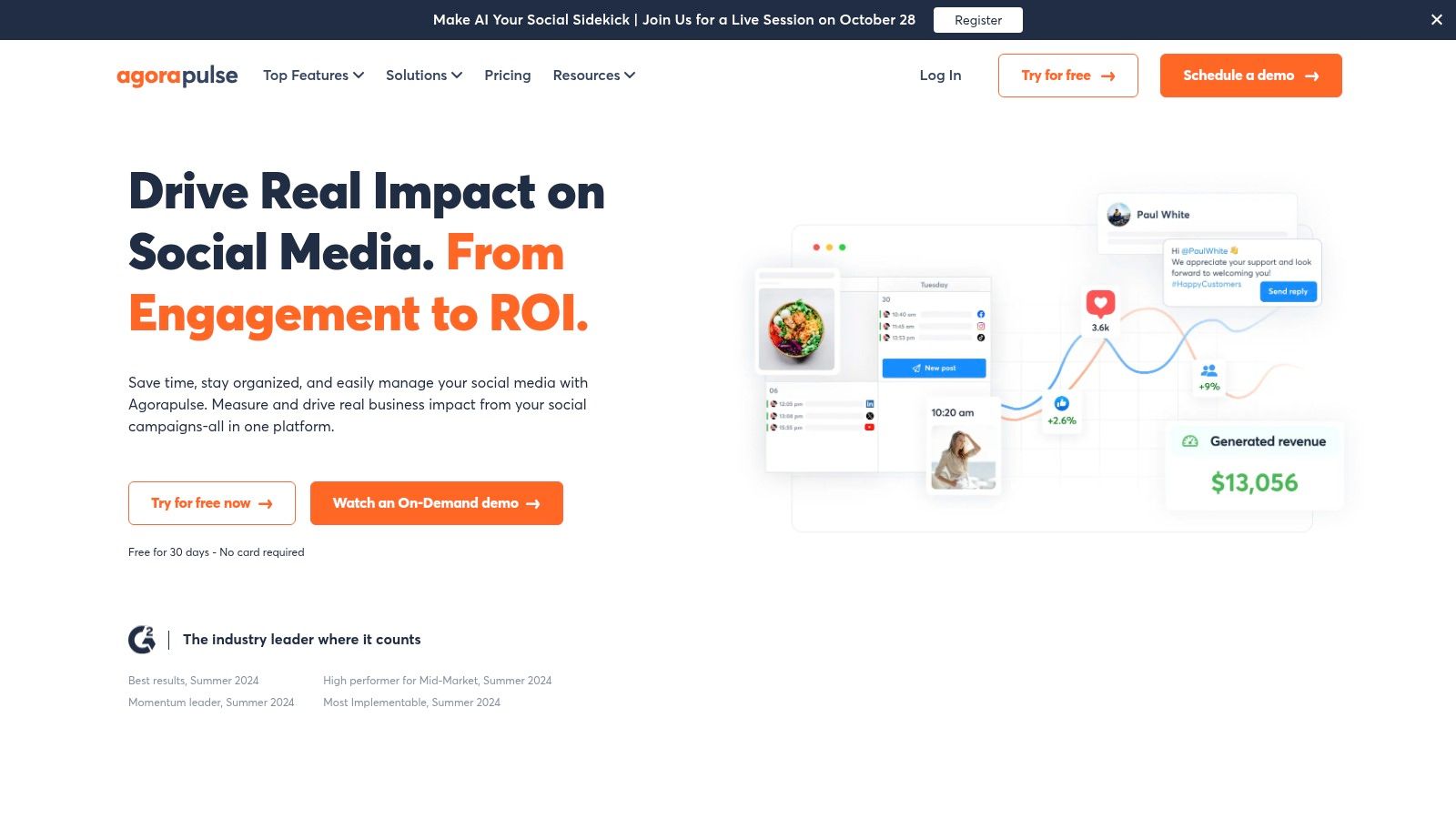
The platform is engineered to bring order to the chaos of social media engagement. Its inbox automatically detects and syncs comments from Meta, LinkedIn, and TikTok ads, a critical feature for startups running paid campaigns. This allows teams to manage both organic and paid conversations in one place, respond to customer queries, and hide or remove spam with automated moderation rules. This framework for operational efficiency saves significant time and protects brand reputation.
Core Features & Use Case
For a startup focused on community building or customer support via social media, Agorapulse’s team workflow features are invaluable. It allows managers to assign conversations to specific team members and review responses before they go live, a key best practice for team building and quality control. The powerful reporting tools, including ROI tracking with Google Analytics integration, also help demonstrate clear value to stakeholders.
- Key Feature: Unified social inbox with ad comment monitoring and automated moderation rules.
- Ideal Use Case: A D2C e-commerce startup running extensive Facebook and Instagram ad campaigns. The team can use Agorapulse to immediately address negative comments on ads, answer product questions to drive conversions, and measure the direct ROI of their social media efforts.
Pricing and Limitations
Agorapulse offers several tiers, starting with a limited free plan for very small teams. Paid plans begin with the Standard plan at $49 per user/month (billed annually), scaling to Professional and Advanced tiers. The per-user pricing model can become a significant expense for growing teams. While its core inbox and publishing features are strong, some of the more advanced social listening and competitor analysis tools are reserved for the higher-priced plans.
Website: https://www.agorapulse.com/
6. Sendible
Sendible is a powerful social media management platform built with agencies and multi-brand startups in mind. It excels at managing complex social media operations across numerous client or product accounts from a single, cohesive interface. The platform's strength lies in its white-label options and client-focused features, like separate dashboards and custom reporting, positioning it as one of the best social media management tools for teams that handle multiple brands, a common challenge in venture-backed portfolios.
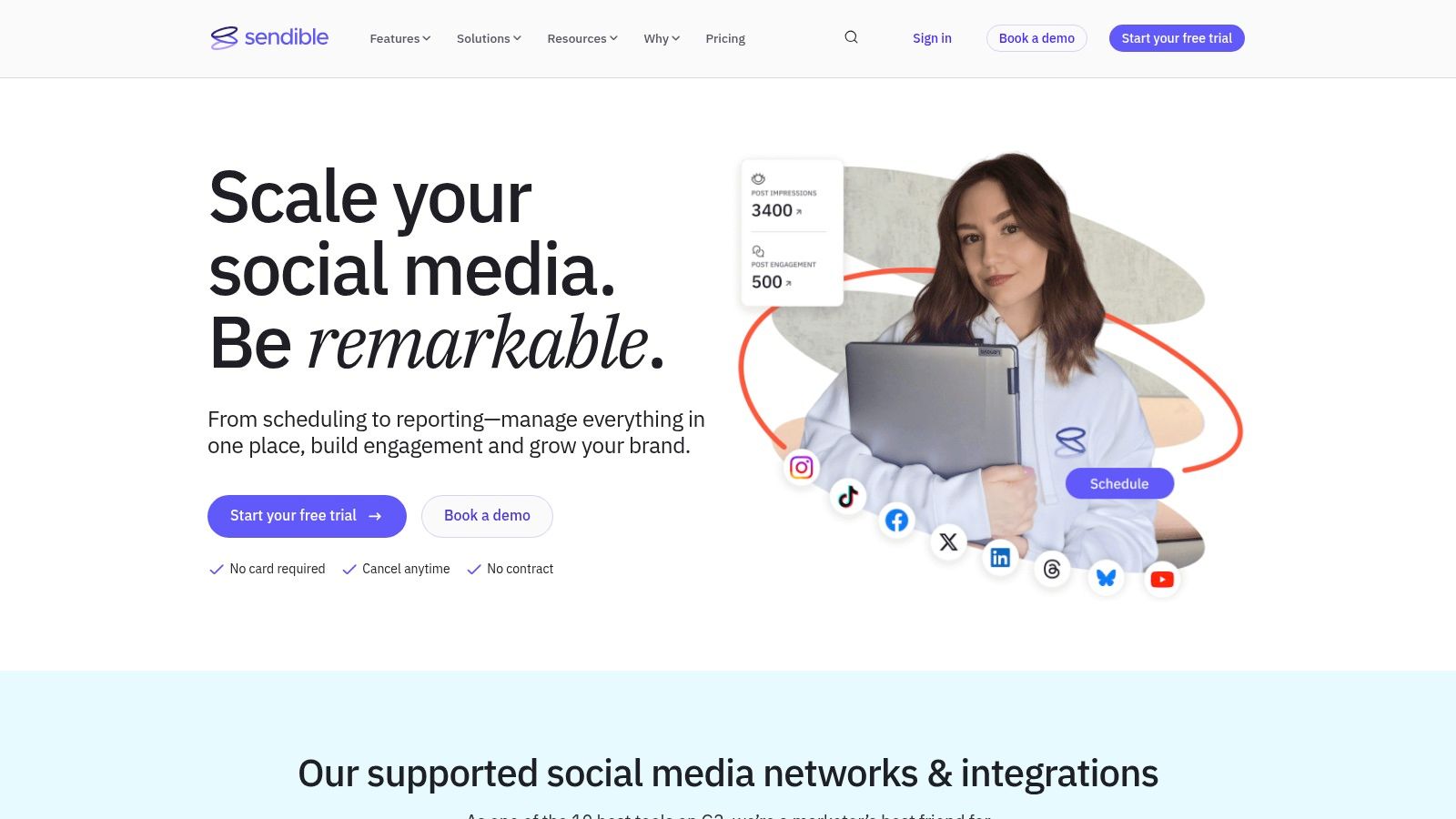
The platform offers a comprehensive suite of features, including content queues, shared asset libraries, and integrated Google Analytics reports to prove ROI. Its multi-calendar scheduling and bulk posting capabilities are particularly effective for startups running extensive content campaigns as part of their authority-building strategy. Sendible’s all-in-one Social Inbox also consolidates messages and comments, ensuring prompt engagement and streamlined communication workflows.
Core Features & Use Case
For a startup managing social media for several portfolio companies or distinct product lines, Sendible's client dashboards are invaluable. Each brand gets a dedicated, secure workspace with its own social profiles, content libraries, and approval workflows. This structure prevents cross-posting errors while allowing managers to oversee all activity from a central hub, demonstrating operational excellence.
- Key Feature: White-label dashboards and customizable reporting for managing multiple brands or clients.
- Ideal Use Case: A startup marketing agency or a parent company managing the social presence for multiple sub-brands. The team can provide each sub-brand with its own branded dashboard for content approval and performance review, creating a professional and organized client management experience.
Pricing and Limitations
Sendible offers excellent value, starting with its Creator plan at $29/month for one user and six social profiles. Plans scale up to Agency and custom white-label solutions. However, some advanced features are reserved for higher tiers, and the white-label functionality is a paid add-on. Additionally, its live chat support is primarily aligned with UK business hours, which could be a limitation for globally distributed teams needing immediate assistance.
Website: https://www.sendible.com/
7. SocialPilot
SocialPilot carves out its niche by offering a powerful, agency-focused feature set at a price point that is highly accessible for growing startups. It delivers core functionalities like bulk scheduling, a unified social inbox, and detailed analytics without the enterprise-level cost, making it one of the best social media management tools for teams prioritizing value and scalability. The platform is particularly strong for organizations managing multiple brands, thanks to its white-label reporting and client management features.
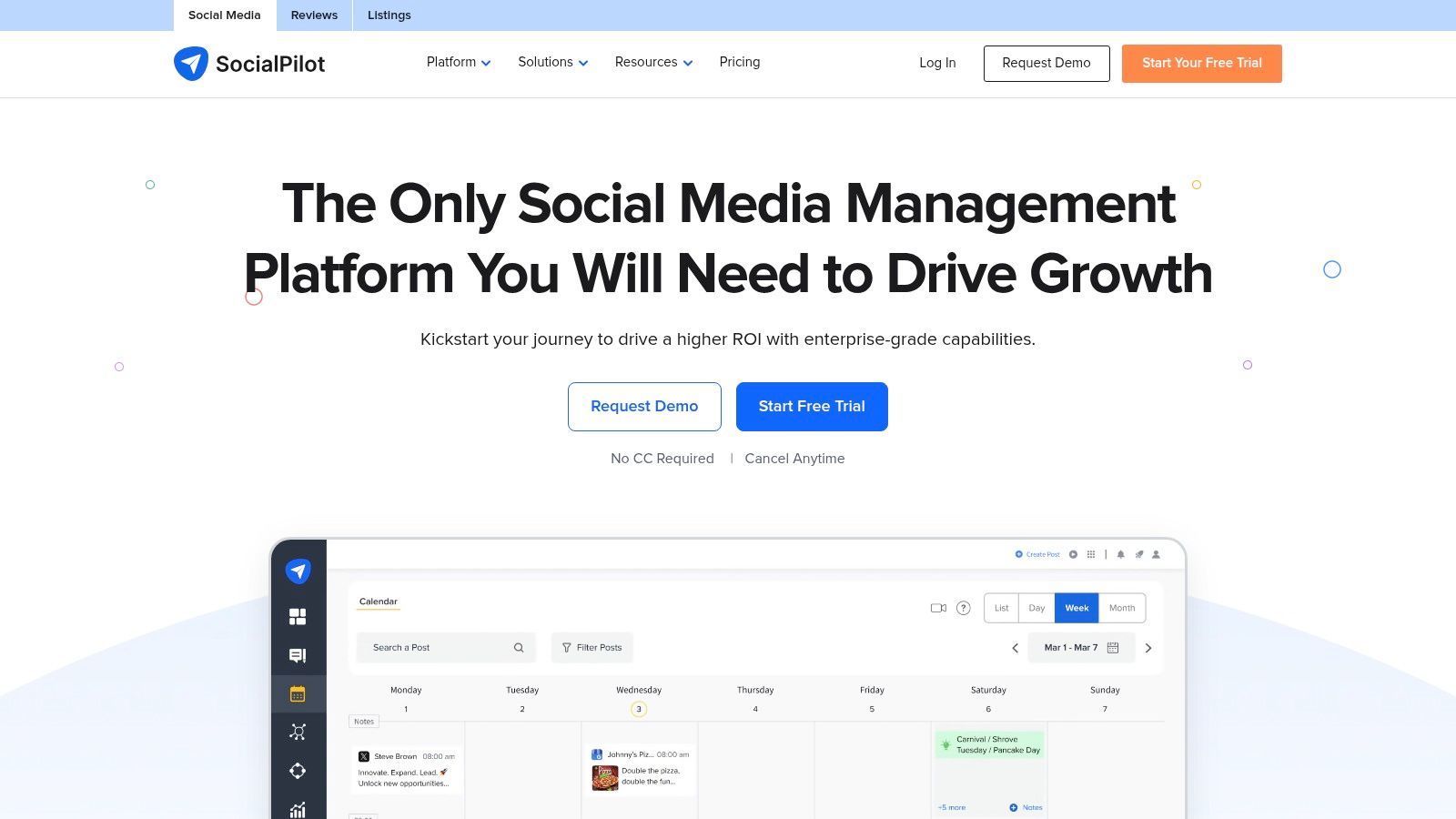
This SaaS platform is designed for efficiency, allowing startups to manage a high volume of content with minimal effort. Its bulk scheduling feature, which lets users upload up to 500 posts at once via a CSV file, is a significant time-saver. Additionally, RSS feed automation helps teams consistently share relevant industry content, positioning their brand as a thought leader with a steady stream of valuable information—a key pillar of digital authority building.
Core Features & Use Case
For a lean marketing agency or a startup with multiple product lines, SocialPilot’s collaboration and client management tools are invaluable. Teams can set up approval workflows to ensure content quality before publishing, and on higher-tier plans, provide clients with their own secure, white-labeled portal to view reports. This framework streamlines communication and enhances professionalism without needing a complex, custom-built solution.
- Key Feature: White-label reporting and dedicated client management portals.
- Ideal Use Case: A bootstrapped digital marketing agency managing social media for five different B2C startups. The agency can use SocialPilot to schedule content across all client accounts, manage engagement from a single inbox, and provide each client with professional, branded performance reports.
Pricing and Limitations
SocialPilot offers an aggressive pricing structure, starting with the Professional plan at $30/month for one user and 10 social accounts. While this affordability is a major advantage, the platform lacks some of the deep social listening and advanced enterprise governance features found in more expensive suites. The user interface, while functional, is also less extensive than top-tier competitors, which may be a consideration for teams needing highly complex workflow customizations.
Website: https://www.socialpilot.co/
8. Loomly
Loomly stands out as a highly collaborative and user-friendly platform, specifically engineered for teams that prioritize content planning and approval workflows. It provides a clean, calendar-centric approach to social media management, making it an excellent choice for startups and agencies needing to streamline content creation from idea to publication. Rather than overwhelming users, Loomly focuses on a refined, step-by-step process for crafting, optimizing, and scheduling posts—a best practice for efficient operations.
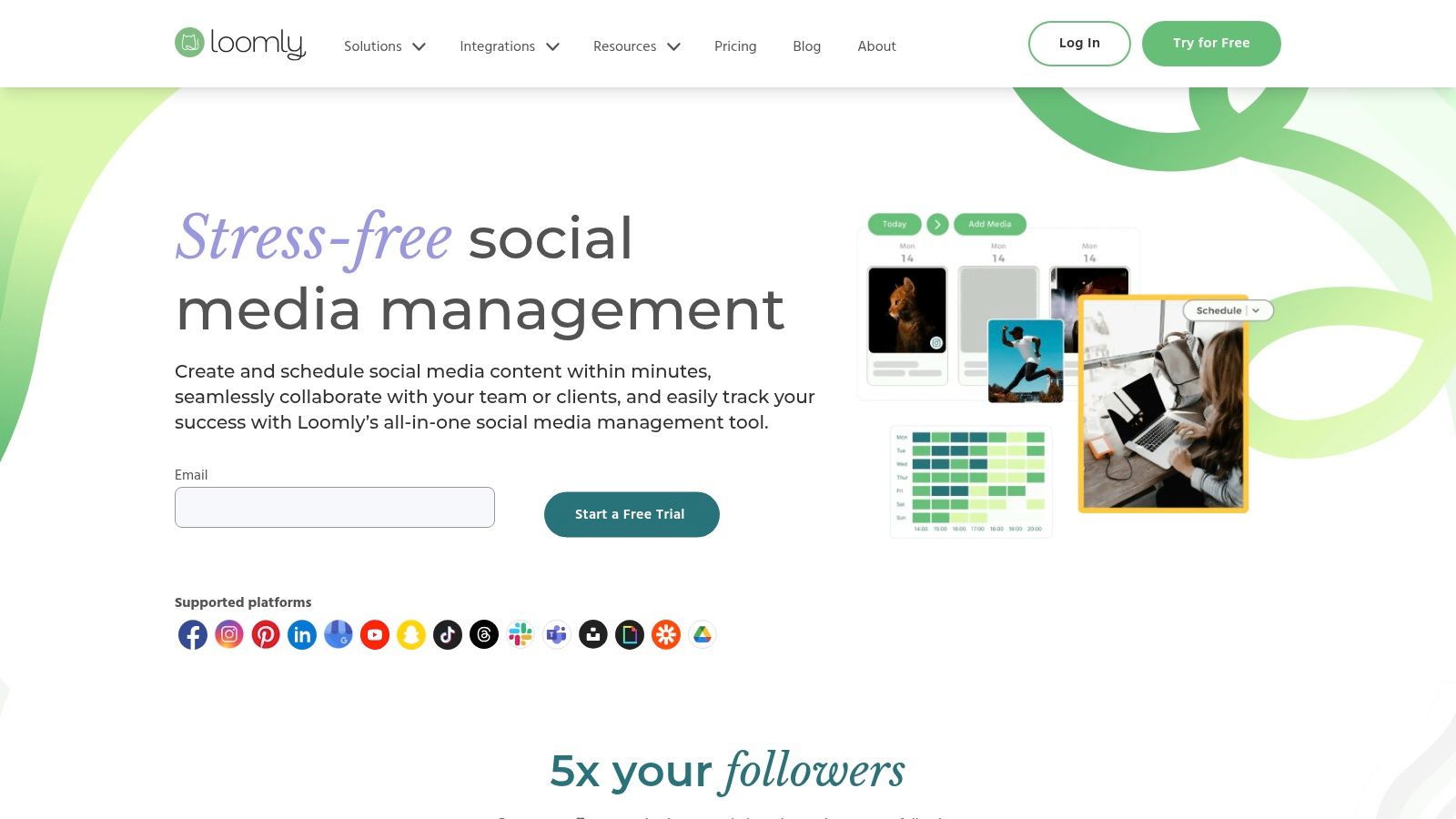
The platform’s strength lies in its collaborative core. It guides users through a logical content creation flow that includes defining post objectives, setting audiences, and getting real-time optimization tips before a post ever goes live. This structured process, combined with a central asset library and clear approval states (e.g., Draft, Pending Approval, Approved), makes it one of the best social media management tools for maintaining brand consistency across a growing team.
Core Features & Use Case
For a startup working with freelance content creators or a small agency managing multiple client accounts, Loomly's approval system is invaluable. A creator can submit a post draft, complete with platform-specific variations for Instagram, LinkedIn, and Threads. The account manager then receives a notification to review, comment on, and approve the content directly within the platform, eliminating confusing email chains and spreadsheets and improving the team-building experience.
- Key Feature: Guided post-creation workflow with built-in optimization tips and multi-level approval queues.
- Ideal Use Case: A marketing agency managing social media for several e-commerce startups. The team uses Loomly’s separate calendars and asset libraries for each client, inviting clients as collaborators to approve content before it’s scheduled, ensuring transparency and efficient feedback.
Pricing and Limitations
Loomly offers a 15-day free trial, with its paid plans starting at $32/month (billed annually) for the Base plan. Plans scale up to Standard, Advanced, and Premium tiers with more users and accounts. While its collaborative workflows are top-notch, its native social listening and in-depth analytics are less robust compared to enterprise-level suites. Startups requiring deep competitive analysis may need to supplement Loomly with a specialized tool.
Website: https://www.loomly.com/
9. Metricool
Metricool stands out by offering a compelling, value-driven package perfect for startups prioritizing budget efficiency. It bundles scheduling, robust analytics, competitor tracking, and ad management into an accessible platform with a generous free tier. For early-stage companies needing to prove ROI without significant upfront investment, Metricool provides a comprehensive suite of features that punch well above its price point, making it a pragmatic choice for founders focused on lean operations and financial management.
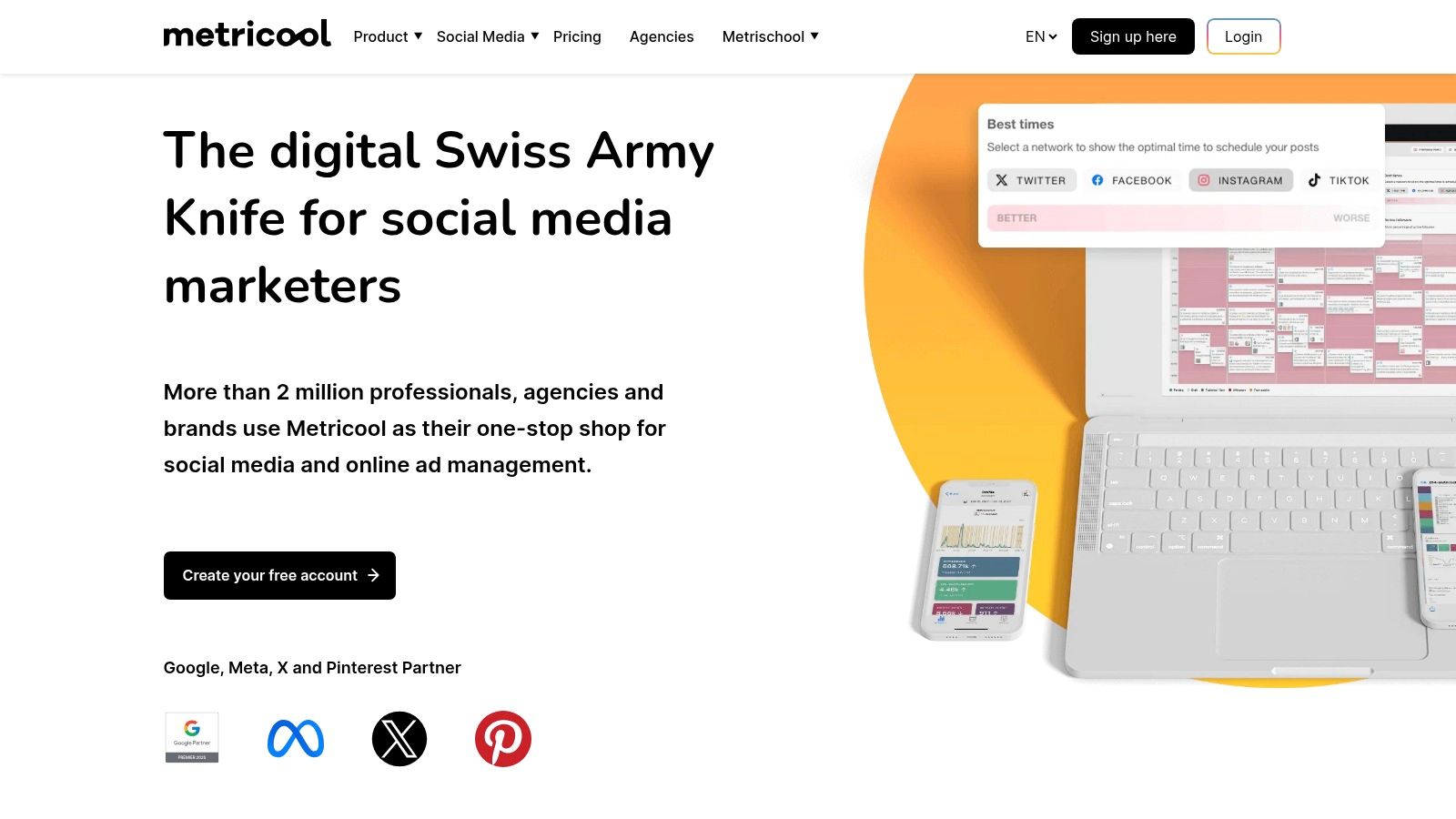
The platform’s strength lies in its all-in-one approach to data and content. Users can schedule posts with an AI assistant for content generation and identify optimal posting times based on audience engagement. Its reporting features are particularly strong, allowing startups to easily track growth, analyze competitor performance, and integrate data from social ad campaigns. This focus on analytics provides founders with the clear, actionable insights needed to make data-informed marketing decisions.
Core Features & Use Case
For a startup bootstrapping its marketing efforts, Metricool’s Planner is a central hub for managing content across multiple platforms. Its "autolists" feature allows teams to create evergreen content queues that automatically republish posts, ensuring consistent social media activity with minimal effort. The built-in "SmartLinks" feature also provides a customizable link-in-bio page, a crucial tool for driving traffic from Instagram and TikTok without needing a separate subscription service.
- Key Feature: Comprehensive analytics and reporting, including competitor analysis and ad campaign integration.
- Ideal Use Case: An e-commerce startup using Instagram and Facebook ads needs to track both organic content performance and paid campaign ROI. The team can use Metricool to schedule posts, monitor competitor engagement, and pull unified reports that show how their ads are impacting follower growth and website clicks.
Pricing and Limitations
Metricool's pricing is one of its biggest advantages. It offers a powerful Free plan for one brand with significant functionality. Paid plans start with the Starter tier at a highly competitive $22/month for 5 brands. This affordability makes it one of the best social media management tools for teams managing multiple brand accounts. However, the free plan has post limits, and connecting an X/Twitter profile requires a paid add-on, a drawback for startups active on that platform.
Website: https://metricool.com/
10. HubSpot Marketing Hub (Social tools)
For startups already embedded in the HubSpot ecosystem, the social media tools within Marketing Hub offer an unparalleled advantage: seamless integration with a powerful CRM. This transforms social media from a standalone channel into an integrated component of the entire customer journey. Instead of just tracking vanity metrics, teams can directly attribute social media interactions to leads, deals, and revenue, making it one of the best social media management tools for proving ROI and meeting investor expectations.
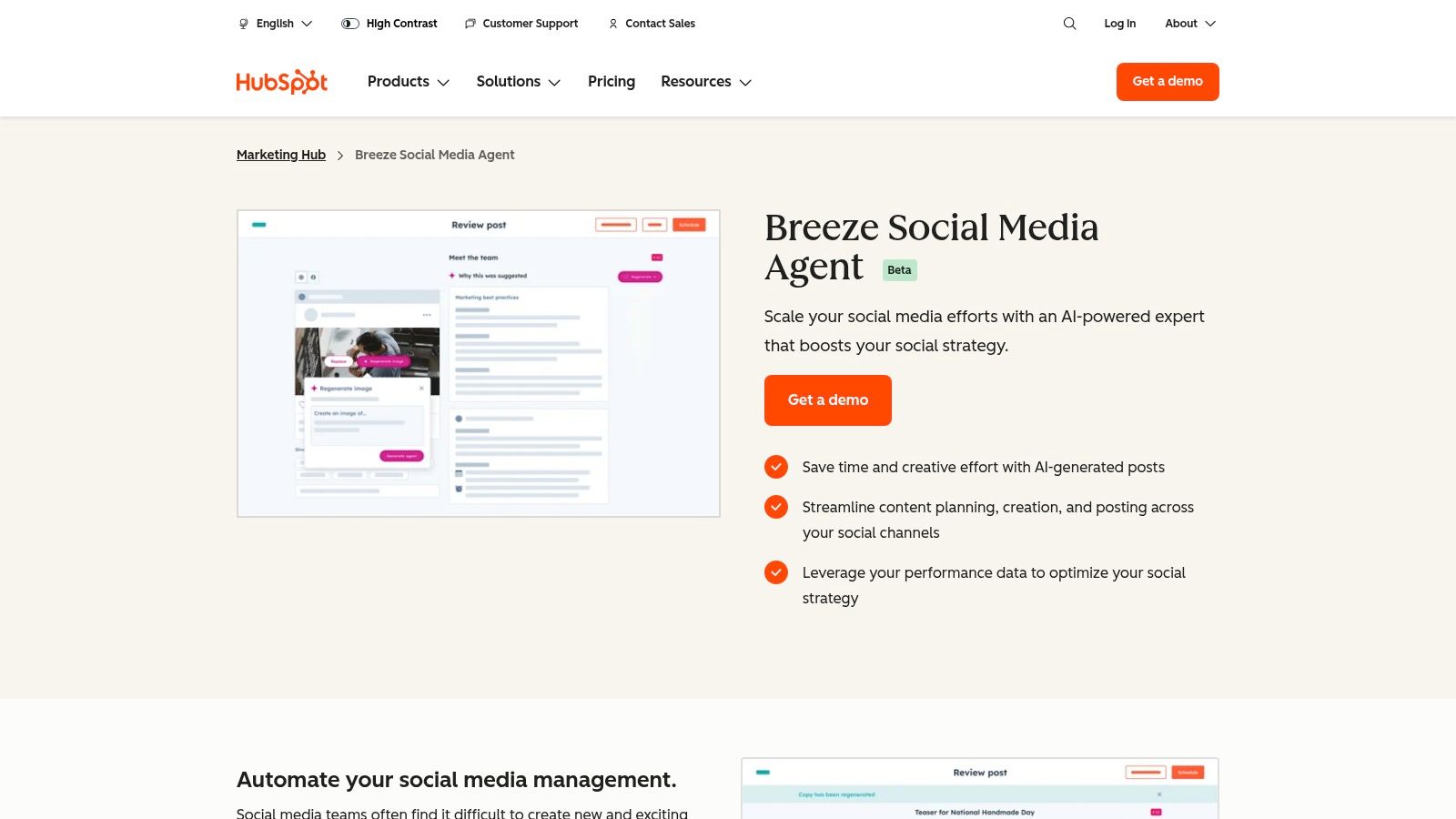
The platform streamlines publishing and monitoring by connecting every social interaction back to a contact record in the CRM. Teams can schedule posts in bulk, monitor keywords, and manage conversations from a unified inbox. Its standout features are the AI tools, including a social caption generator and the new AI Social Media Agent, Breeze, which helps create and scale campaign content, optimizing team efficiency.
Core Features & Use Case
HubSpot’s true power lies in its reporting. A startup can launch a LinkedIn campaign, track which specific leads engaged with the content, and see how many converted into paying customers, all within one system. This closed-loop reporting is a game-changer for justifying marketing spend and optimizing strategy based on revenue impact, a hallmark of founder excellence and data-driven leadership.
- Key Feature: Direct CRM integration for tracking social media ROI and lead generation.
- Ideal Use Case: A B2B startup using HubSpot for sales and marketing wants to prove the value of its social media efforts. They can publish case studies on LinkedIn, track which prospects click through, and create reports showing exactly how much pipeline was generated from that social campaign.
Pricing and Limitations
HubSpot's social media tools are included in its Marketing Hub plans, starting with limited features in the Starter plan ($18/month, billed annually) and becoming more robust in the Professional tier ($800/month, billed annually). The primary limitation is the cost; purchasing Marketing Hub solely for its social tools is not economical. It is best suited for businesses already committed to HubSpot’s all-in-one platform for customer acquisition and operations.
Website: https://www.hubspot.com/products/marketing/social-media-ai-agent
11. Zoho Social
Zoho Social stands out by offering a robust, full-featured platform at an extremely competitive price point. It’s an ideal choice for startups already invested in the Zoho ecosystem or those seeking a powerful, budget-friendly solution without sacrificing core functionalities. The platform provides a complete suite covering scheduling, monitoring, a unified inbox, and detailed analytics, making it a strong contender for businesses focused on operational efficiency and ROI.
The platform is designed for streamlined workflow management. Its publishing calendar allows for bulk scheduling and content queuing, while the SmartQ feature analyzes audience engagement to suggest the optimal times to post, maximizing visibility. The unified inbox and monitoring dashboard enable teams to track brand mentions and keywords from a single location, ensuring timely responses and effective brand management—a key element of building digital authority.
Core Features & Use Case
For a startup leveraging Zoho’s other products like Zoho CRM or Desk, the native integration is a game-changer. Social media interactions can be converted directly into CRM leads or support tickets, creating a seamless customer lifecycle management process. This framework eliminates data silos and empowers sales and support teams with rich social context, turning social media from a marketing channel into a core business function.
- Key Feature: Deep integration with Zoho CRM, allowing teams to sync social media leads and contacts directly into their sales pipeline.
- Ideal Use Case: A B2C e-commerce startup using Zoho CRM that wants to track social media lead generation. They can identify a potential customer's inquiry on Twitter, add them as a lead in CRM, and track the entire sales journey from that initial social interaction.
Pricing and Limitations
Zoho Social’s pricing is one of its most attractive aspects, with a free plan for one brand and user. Paid plans start with the Standard tier at just $10/month, scaling to Professional and Premium plans. While the value is exceptional, some of the more sophisticated analytics, like competitor tracking and sentiment analysis, are reserved for the higher-priced tiers. Additionally, its user interface, while functional, may not feel as polished as more expensive enterprise-level suites.
Website: https://www.zoho.com/social/
12. G2 – Social Media Management Category
While not a management tool itself, G2’s Social Media Management category is an indispensable resource for startup founders. It serves as a comprehensive peer-review and comparison engine, allowing leaders to validate options and discover tools that best fit their specific stage and budget. By aggregating thousands of user reviews, G2 provides unfiltered insights that cut through marketing jargon, making it a crucial stop in the decision-making process for finding the best social media management tools.
The platform’s strength lies in its segmentation and data-driven rankings. Startups can filter tools specifically for "Small Business" needs, comparing them on features, ease of use, and quality of support based on reports from actual users. This peer-validated data helps teams avoid costly mistakes by identifying potential limitations or hidden costs before committing to a subscription, ensuring the selected tool aligns with their operational workflow and startup growth strategies.
Core Features & Use Case
For a founder tasked with choosing a social media tool, G2 streamlines the research process. They can build a shortlist by comparing platforms side-by-side, read detailed reviews from companies of a similar size, and quickly grasp the primary pros and cons of each option. This data-backed approach empowers them to make a confident, well-informed purchasing decision without relying solely on vendor claims, a key attribute of successful leadership.
- Key Feature: User-generated reviews segmented by company size and industry.
- Ideal Use Case: An early-stage startup founder evaluating three different social media management tools. They use G2 to compare real user feedback on each platform's analytics reporting and customer support responsiveness, ultimately choosing the tool most praised for its intuitive interface by other small businesses.
Pricing and Limitations
Access to G2’s reviews and comparison data is free for users. The platform's business model relies on vendors paying for enhanced profiles. This can create a potential limitation, as sponsored placements or tools from vendors who participate more actively on the platform may gain more visibility. Additionally, while user reviews are plentiful, some newer tools may lack a sufficient volume of feedback for a robust evaluation.
Website: https://www.g2.com/categories/social-media-mgmt/small-business
Top 12 Social Media Management Tools Comparison
| Tool | Core Features & AI ✨ | User Experience & Quality ★★★★☆ | Value & Pricing 💰 | Target Audience 👥 | Unique Selling Points 🏆 |
|---|---|---|---|---|---|
| Hootsuite | Multi-network scheduling, AI caption/hashtag, Canva integration | Mature workflows, deep analytics, strong team features | Mid-to-high; per seat pricing escalates | Large teams & enterprises | Broad integrations, competitor benchmarking |
| Sprout Social | Publishing, engagement, AI Assist, review management | Best-in-class reporting, enterprise support | Premium, higher starting cost | SMBs to large enterprises | Award-winning reporting depth, strong insights |
| Buffer | Scheduling, engagement inbox, AI Assistant | Clean UI, easy onboarding | Budget-friendly, pay-per-channel | Creators & small teams | Flexible pricing, simple usage |
| Later | Visual planner, Instagram/TikTok focus, AI content assistant | Excellent visual UX, collaboration tools | Moderate, post limits on starter plans | Creators & brands | Visual calendar, link-in-bio, product tagging |
| Agorapulse | Unified inbox (organic/paid), listening, ROI integrations | Robust inbox/mod tools, scalable for agencies | Mid-to-high, per user billing | Agencies | White-label reporting, advanced moderation |
| Sendible | Multi-calendar, client dashboards, white-label | Strong for multi-client setups, flexible bundles | Mid-range, some premium add-ons | Agencies & SMBs | Customizable white-label, client dashboards |
| SocialPilot | Bulk scheduling, AI credits, inbox approvals | Aggressive pricing, easy scaling | Low-to-mid, value-focused | Growing agencies | Competitive pricing, scalable users |
| Loomly | Content calendar, post variants, tutorials | Collaborative workflows, nonprofit discounts | Trial required, enterprise upgrade available | Teams & clients | Client collaboration, enterprise support |
| Metricool | Scheduling, competitor tracking, ads integration, AI assistant | Strong free plan, affordable scaling | Excellent value, some network limits | Brands & SMBs | Robust free tier, link-in-bio support |
| HubSpot Marketing Hub | CRM-integrated social publishing, AI Social Media Agent | CRM-level attribution, rich reporting | High price, better if using HubSpot ecosystem | Existing HubSpot users | Deep CRM-social integration, AI content scaling |
| Zoho Social | Scheduling, SmartQ timing, AI-assisted replies (Zia), reports | Competitive pricing, Zoho ecosystem integration | Affordable with free plan | SMBs within Zoho ecosystem | AI replies, strong CRM integration |
| G2 (Category overview) | Tool comparisons by size, aggregated reviews, pricing snapshots | Large volume user reviews, rankings, badges | Free to use | Buyers/researchers | Comprehensive market insights, validated feedback |
From Tool to Asset: Integrating Social Media into Your Growth Engine
Navigating the landscape of the best social media management tools can feel overwhelming for any founder. We've dissected a dozen leading platforms, from comprehensive enterprise solutions like Sprout Social to nimble, startup-friendly options like Buffer. Each tool presents a unique combination of features and pricing, underscoring a critical truth: the "best" tool is not a universal title but one entirely dependent on your startup's specific stage, growth strategies, and resources.
Your journey doesn't end with selecting a platform. The greatest opportunity lies in transforming your chosen tool from a scheduling utility into a core component of your growth engine. It's about moving beyond rote content posting and embracing a strategic, data-informed approach to building your brand, engaging your community, and driving measurable business outcomes. The platforms we've explored are the vehicles; your strategy is the engine that powers them forward.
Actionable Insights for Founders
As you move from evaluation to implementation, keep these strategic pillars in mind. They are the frameworks that ensure your investment in a social media management tool yields tangible returns for fundraising, talent acquisition, and customer loyalty.
1. Define Your "Why" Before Your "Which":
Before you commit, revisit your core business objectives. Are you focused on lead generation, brand awareness, or customer support? Your primary goal dictates the features you should prioritize.
- For Lead Generation: Look for tools with strong analytics and CRM integrations to meet investor expectations (like HubSpot or Sprout Social).
- For Brand Authority: Prioritize platforms with robust content creation and visual planning features to build credibility (like Later or Loomly).
- For Lean Operations: If budget is your main constraint, a tool known for efficiency and affordability is key (like Buffer or SocialPilot).
2. Look Beyond the Feature List:
Focus on the user experience (UX) and the learning curve. A complex platform your team won't use is a wasted investment. A core attribute of successful founders is adaptability; choose a tool that your team can adopt seamlessly. Take full advantage of free trials to assess the day-to-day workflow and ensure it aligns with your team’s capabilities.
3. Integration Is Non-Negotiable:
Your social media tool cannot operate in a silo. Its ability to integrate with your existing tech stack (your CRM, analytics platform, design tools) is paramount. Seamless integration prevents data fragmentation and turns social media insights into actionable business intelligence that can inform sales, product development, and customer service.
4. Prepare for Scalability:
The tool that serves your two-person founding team may not be sufficient when you scale to a team of twenty. Consider the platform's ability to grow with you. Look at pricing tiers, team management features, and approval workflows. Choosing a tool with a clear scalability path, like Agorapulse or Sendible, can prevent a costly migration down the road.
Ultimately, the most powerful social media management tool is the one that gets used consistently and strategically. It should simplify your workflow, provide clear, actionable data, and empower your team to build authentic connections with your audience, turning followers into advocates. Choose wisely, implement thoughtfully, and integrate your tool into the very fabric of your startup’s growth strategy.
Finding the right tools is just one piece of the puzzle. At Spotlight on Startups, we provide the frameworks, case studies, and expert insights you need to build a visible and authoritative brand. Discover actionable strategies for leveraging your social presence to attract investors, talent, and customers at Spotlight on Startups.